Sunday, September 09, 2018 14.01PM / Ayo Teriba, CEO Economic Associates, Date Written: July 16, 2016
We recall this article to serve as a deep-dive into 2016 expectations to aid necessary reality check(s) and policy formulation in 2018 and beyond.
You can join the author, Ayo Teriba at the Economic Associates (EA) one-day conference on Nigeria’s Economic Outlook on Thursday, 27 September 2018 holding at the Lagos Continental Hotel, Kofo Abayomi Street, Victoria Island, Lagos from 9.00am. Conference Registration can be found here https://proshare.co/articles/legacy/news/41634
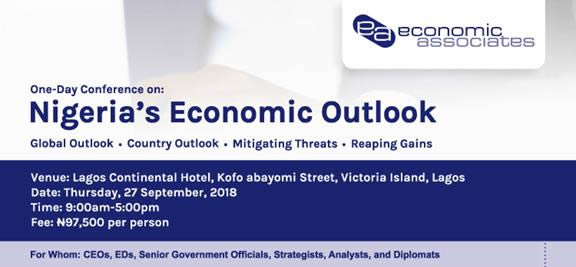
Abstract
Nigeria’s economic situation in 2016 is fast degenerating into early eighties-like doomsday situation in which oil price collapse is translating into a currency crisis, inflationary spiral, fiscal collapse, and recession. This should not be so at all as this time is fundamentally different from the early eighties. The essential difference is that the global economy that had been burdened by a debt crisis then is now awash with liquidity. It should therefore be easy for Nigeria to attract enough foreign investment inflows into infrastructure sectors to compensate for the foreign income lost to the fall in oil price.
The new government in Nigeria will have to do three things:
(i.) Break the government monopoly that shuts investment out of network infrastructure sectors;
(ii.) Attract foreign direct investment, through immediate IPOs on existing state-owned enterprises, and new licences for greenfield projects nationwide; and,
(iii.) Engage the world about the investment opportunities in the Nigerian economy.
The new regime could have taken these measures since its inception in May 2015 to avoid the deterioration in domestic economic realities. The steps have to be taken now to stem further deterioration, and induce a turnaround.
Contents
1. Déjà Vu?
2. Crisis of The Early Eighties
3. The Current Crisis
4. Why This Time Is Different
5. The Way Forward
i. Break Government Monopoly that Shuts Foreign Investment out
ii. Attract Foreign Investment to Fix Foreign Exchange Scarcity and Infrastructure Decay
iii. Engage the World about the Future of the Nigerian Economy
6. Summing up
1. Déjà Vu?
This is not the first time that Nigeria is facing export income decline following a steep fall in oil price. The first time was in the early eighties and it spelt doom for the Nigerian economy for almost two decades. This time is rapidly degenerating into early eighties-like doomsday situation in which oil price collapse is translating into a currency crisis, inflationary spiral, fiscal collapse, and recession. This should not be so at all as this time is fundamentally different from the early eighties.
Nigeria should easily find a way around the loss of export income by taking advantage of glaring opportunities to attract foreign investment to move the economy forward. Such opportunities were not available in the 1980s. The essential difference is that the global economy that had been burdened by a debt crisis when then is now awash with liquidity, and it should be easy for Nigeria to attract enough foreign investment inflows into infrastructure sectors to compensate for the export income lost to the fall in oil price. Nigeria can rapidly build the capital account buffers required to cope better with the decline in income from oil exports.
2. Crisis of The Early Eighties
Nigeria’s first export income collapse came in 1982, about 20 years after independence, and after almost a decade the of oil boom that started in 1973. The economic and financial realities facing Nigeria in the early 1980s were so bleak as the country was already burdened with heavy external debt before the fall in commodity prices triggered the collapse in export earnings, and the emergence of the global debt crisis in 1982 triggered a severe global liquidity shortage for the rest of the decade. The export income collapse thus coincided with intense external debt service pressures at a time when global illiquidity foreclosed any hope of relief from foreign capital inflows.
Consequently, Nigeria had to go through a painful economic stagnation and structural adjustment. The economy deteriorated, Federal and State governments retrenched workers massively, multinationals exited the country in droves, and infrastructure deteriorated. The situation was used to justify a series of military coups- December 1983, August 1985, and November 1993, in which successive regimes blamed the ousted ones for the nation’s economic woes, only to find that the grim economic situation was no fault of the ousted regimes. This situation persisted until 1999 when the return of Nigeria to democratic rule coincided with a strong recovery in global commodity prices, accompanied by a surge in global liquidity.
3. The Current Crisis
The oil price collapse that started in July 2014 has inflicted sharp declines in export earnings, putting downward pressure on Nigeria’s external reserves to the point that the Naira exchange rate has now moved from about N150/US$ to about N300/US$ by mid-2016: specifically, the inter-bank rate is now at N280/US$; while the BDC rate is now at N330/US$, both were more or less at par at around N150/US$ mid-2014. (Charts 1 to 5.)
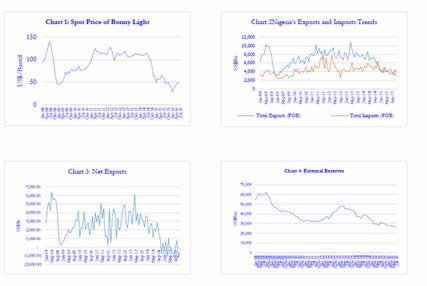
Consumer price inflation has reached a six-year peak of 16.5 percent in June 2016 as a result of devaluation of the parallel market rate and increases in the electricity tariff and pump prices of petroleum products. (Chart 6). Government revenue has dwindled to the point that more than half of the States are unable to meet their workers’ salary commitments, and the Federal Government is funding its entire capital spending, and indeed 36.7 percent of its 2016 budget, with debt.
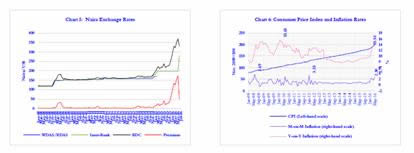
Economic activity had contracted as a combined result of the global commodity price weaknesses and reduced access of domestic businesses to foreign exchange supply. Quarterly real GDP growth has slowed from 6.77 percent in the first quarter of 2014 to -0.4 percent in the first quarter of 2016 and stock market capitalization has fallen from a historic peak of N14 trillion in June 2014 to N8.2 trillion in January 2016, before recovering to N10.1 trillion in June 2016. (Charts 7 and 8.)

4. Why This Time Is Different
These economic hardships are reminiscent of the early and mid-eighties, especially the foreign exchange rationing, dramatic movements in the dual exchange rates, government having difficulties meeting workers’ salary commitments, and a recession. But this time is quite different from the early eighties as Nigeria has a clear way out of the present crisis, unlike in the eighties when there was no way out.
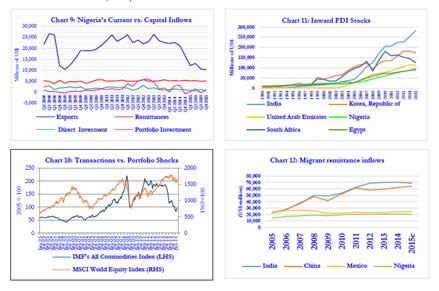
The oil price induced current account crisis is happening at a time the global economy is awash with liquidity and many of Nigeria’s emerging market peers are successfully attracting record levels of foreign direct investment and diaspora investment inflows. Nigeria should adopt immediate measures to join the ranks of these countries and attract investment inflows on its capital account to offset the export income lost on the current account because of the collapse in oil price. Saudi Arabia is currently pursuing this strategy by attracting the world’s attention to its non-oil investment opportunities. Nigeria is much better placed to do so than Saudi Arabia because Nigeria has a much bigger non-oil economy than Saudi Arabia, thereby offering much bigger non-oil investment prospects. A long and growing list of emerging markets is capitalizing on the global liquidity glut2 to attract and retain record levels of foreign investment inflows.
5. The Way Forward
The most worrying fact about Nigeria’s external financial inflows is that two current account items, export revenue and diaspora remittances, are the only two significant sources of foreign exchange supply. Capital account inflows into Nigeria, in the form of direct investment and portfolio investment, are very weak. And this must be immediately redressed. In 2015, Nigeria’s exports were US$45.89 billion, while diaspora remittances were US$20.41 billion, compared to foreign direct investment of US$3.06 billion, and foreign portfolio investment of US$2.54 billion3. Such weakness in the capital account makes the oil price induced current account crisis more hurtful than it should have been in the presence of buffers from stronger capital inflows. The way forward for Nigeria is to fix this weakness in the capital account by taking the following three measures: (i.) Break government monopoly that shuts foreign investment out; (ii.) Attract foreign investment to fix foreign exchange scarcity and infrastructure decay, through immediate IPOs on existing state-owned enterprises, and new licences for greenfield projects; (iii.) Engage the world about the future of the Nigerian economy.
i. Break Government Monopoly that Shuts Foreign Investment out
Nigeria has the potential to attract and retain significant inflows of foreign direct investment into its large network infrastructure sectors, including rail transportation, gas pipelines, and electricity transmission, as it has successfully done in telecommunications, but failure to abolish government monopoly in these sectors keeps shutting the investment out. Nigeria’s stock of foreign direct investment is currently concentrated in two sectors, telecommunications and oil & gas. These are the only two sectors in which the government has liberalized entry of foreign direct investment. Government monopoly in key infrastructure sectors, like rail transportation, gas pipelines, and power transmission, obstructs beneficial FDI inflows. The new government in Nigeria needs to take immediate measures to break government monopoly in the critical infrastructure sectors to allow the inflow of needful foreign investment. Box 1 discusses the urgent need for Nigeria to overcome the reluctance to abolish government monopoly in infrastructure sectors.
Box 1: Nigeria Must Overcome Reluctance to Abolish Government Monopoly
Nigeria has a very poor record of success in privatizing state-owned enterprises in its infrastructure sectors including telecoms and electricity, having more record of success in liberalizing the entrance of greenfield foreign direct investment than in privatizing brownfield projects.
· Telecoms: efforts to privatize the national telecoms career, Nigerian Telecommunications (NITEL) failed catastrophically for decades until it became moribund and its carcass sold about fifteen years after the GSM companies that pushed it out of relevance had been licenced. Nigeria’s telecoms infrastructure today depends on greenfield projects initiated by the GSM companies licenced from 2001. NITEL still went on to fail in spite of the fact that it was also given a reserve GSM license at no cost as the national career, but even that failed after only a few years and is yet to be revived.
· Oil & Gas: fully owned government refineries had not fared any better than NITEL in performance, and the government has not found the will to privatize them giving one excuse after the other for almost three decades. But liberalization that allows major foreign oil companies to partner with joint venture arrangements has served the country particularly well in the production and export of liquefied natural gas, and has also worked fairly well the exploration, production and export of crude oil. The success of FDIs in the two oil and gas examples makes one wonder why the government has not considered such an arrangement for existing and new refineries.
· Electricity: the recent transfer of state-owned electricity distribution assets to private distribution companies (DISCOs) has created a situation in which many of the DISCOs seem to be more interested in what they can gain from the acquired assets than in deploying new investments required to optimise electricity distribution. A striking lesson from the country’s experience with the DISCOs is that transfer of existing government assets to private sector are best carried out through initial public offers (IPOs) that will ensure more transparency and sustainability as more capable investors can always buy out less capable ones.
· Rail, Pipelines and Power Transmission: successive Nigerian governments have also been very reluctant in privatizing existing state-owned network infrastructure assets, like the narrow gauge railway transport system built in the early 1900s, oil and gas pipelines, and electricity transmission network. Nigeria could now gradually put all existing state-owned infrastructure enterprises on the market through IPOs, while liberalizing the entry of foreign direct investment for greenfield projects. The Nigerian Railway Corporation (NRC) who has monopoly over the Nigerian narrow gauge rail system is moribund, just like NITEL was 15 years ago, being effectively irrelevant to the populace. It might be better to bypass it and liberalize entry of high speed rail builders, replicating the pattern of reform in the telecoms sector that saw the arrival of wireless GSM technology supplanting outdated landlines that NITEL had superintended over from colonial days. Since it will make sense to bundle new underground network of pipelines, new overhead electricity transmission network, and new underground fibre optic network with any new rail network construction, Nigeria has opportunity to bundle these infrastructure backbones for interested greenfield investors.
ii. Attract Foreign Investment to Fix Foreign Exchange Scarcity and Infrastructure Decay
Nigeria should attract foreign investment inflows to solve the two main problems that have inflicted recession on the Nigerian economy: inadequate supply of foreign exchange and infrastructure decay. Attracting investment into infrastructure sectors will solve the two problems and will also make the Nigerian economy more competitive as infrastructure gaps are filled. The global economy currently presents a bleak outlook for commodity prices, exports and real economic growth, while offering bright prospects of continued liquidity glut. Developing countries with clear visions of how they want their economies to progress have leveraged on the global liquidity glut to attract record levels of foreign direct investment stocks. Box 2 provides a discussion of the alternative investment opportunities available for Nigeria at this time: FDI, FPI, and Remittances. Box 3 discusses the reasons why FDI is key to Nigeria’s quest for progress at this time. Box 4 discusses why investment promotion is more realistic for Nigeria now than export promotion, Box 5 explains why borrowing to fund capital projects is not a sustainable strategy for Nigeria at this time. Box 6 explains why slogans like Diversification and Buy Nigeria are wishful thinking, given infrastructure gaps, and suggests more realistic slogans.
Box 2: Alternative Investment Opportunities for Nigeria: FDI, FPI, and Remittances
While it is appropriate to highlight investment opportunities in infrastructure as obvious potential destinations for large-scale FDI inflows, Nigeria needs to boost all types of investment inflows into all areas of the economy, although it is a fact that functioning infrastructure would also boost investment inflows to all other sectors.
· Greenfield foreign direct investment involves the creation of tangible and irreversible investment, while brownfield foreign direct investment involves acquisition of existing projects. Both involve active managerial roles and technology transfers. China leads the pack with US$1trillion in FDI stock in 2015, from only US$20 billion in 19904. A fifty-fold increase in FDI stock in 25 years. Rather striking is the fact that Nigeria had hosted US$8.538 billion in FDI stock in 1990, well ahead of South Korea’s US$5.185 billion, or India’s paltry US$1.656 billion at the time, or even UAE’s miniscule US$751 million. All three have since overtaken Nigeria as India’s stock of FDI reached US$282 billion in 2015, South Korea, US$171 billion, UAE, US$111 billion, compared to Nigeria’s US$89 billion (Chart 11). On the African continent, Nigeria was the top investment destination in the early nineties, but has been displaced by South Africa since the turn of the century. To attract foreign direct investment, the Nigerian government will have to do two things: (1.) break its own monopoly in all network infrastructure sectors to allow inflow of foreign direct investment, through immediate IPOs on existing state-owned enterprises, and new licences for greenfield projects; and, (2.) engage the world about the investment opportunities in the Nigerian economy. The new regime could have taken these two measures from its inception in May 2015 to avoid the deterioration in domestic economic realities that has occurred since then. The steps have to be taken now to stem further deterioration, and induce a turnaround.
· Foreign portfolio investment on the contrary only provides needful short and medium term liquidity, and is fully reversible. Many refer to FPI as ‘hot money’, as they can be very volatile. To illustrate, FPI inflows into Nigeria was US$6 billion in the first quarter of 2013, and that must have really been helpful, but it was -US$387 million in the third quarter of 2015, and that must have been equally hurtful.
· Diaspora remittances are mostly irreversible current account private sector inflows that end up in consumption. But some countries have succeeded in encouraging inflows of remittances on the capital account, through the issuance of medium term foreign currency government bonds, with possibility of redemption in local currency on maturity. India did this by issuing multi-year bonds for its citizens in diaspora, thereby inducing capital inflow from remittances as well. Nigeria was the fourth largest destination for remittances in 1990, behind India, China, and Mexico. By 2015, Nigeria had dropped to sixth position, but more significantly, the gap in the quantum of funds remitted had widened from a margin of about US$7 billion in 1990 to US$50 billion in 2015, as India received US$70 billion and China received US$68 billion, compared with Nigeria’s US$20 billion. They had each received about US$22 billion in 1990, compared with Nigeria’s US$15 billion5. We are talking about relative ability of countries to convince their nationals who are resident abroad to remit funds into government coffers back home.
Box 3: Why FDI Is Key
Of the three types of foreign investment, FDI is the easiest and most beneficial for Nigeria to attract at this time. They hold the prospect of bringing investment that is large enough to stabilize Nigeria’s foreign exchange situation, and are likely to look beyond short term macroeconomic risks, fixing their gaze instead on the medium to long term returns, these are clearly high enough for network infrastructure projects in Nigeria to more than compensate for short term macroeconomic risks. Such opportunities for high returns abound in rail and associated property development opportunities across the country, pipelines (and fibre-optic cables) that should ideally be laid beneath the new rail lines, and power transmission that should also ideally be above the new rail tracks. Each of the sector clearly offer huge first mover advantages similar to the ones enjoyed by the early entrants to Nigeria’s GSM telephony. The two sectors in which the Nigerian government has liberalised entry of investors are oil & gas and telecoms. Foreign direct investment had flowed in to the point of saturation. If Nigeria should liberalize investment in rail, pipelines, and power transmission, it is reasonable to expect a similar response from foreign investors who recognize Nigeria’s attraction as the last of the worlds untapped large markets. Thus the major obstacle to the influx of FDI into large infrastructure projects in Nigeria is Federal government monopoly. Unlike FDI, FPI and Diaspora investment will understandably be deterred by short term risks, especially exchange risks or uncertainty, having no medium to long term profit expectations to offset such risks against like foreign direct investors. As such, it would be best to engage portfolio and diaspora investors once FDI inflows are underway to stabilise the foreign exchange situation.
Box 4: It Is Easier to Promote Foreign Investment Inflows Than Exports
Successive Nigerian governments have acted as though they were oblivious of the opportunities on the capital account. It is far easier and quicker for the Nigerian government to promote foreign investment inflow than it is to promote exports, given the current dull prospects for global economic growth, and Nigeria’s low export competitiveness arising from weak infrastructure. There is a large pool of money on the global scene that Nigeria can attract into its large network infrastructure sectors that include nationwide rail transport network, gas pipelines, and electricity transmission. Nigeria probably requires US$1 trillion investment in infrastructure over the next decade to close yawning gaps. The current global liquidity climate will deliver every cent of that sum if the new government can immediately break government monopoly in the sectors and engage the world to come and invest in these sectors. Had Nigeria done this when it opened up the GSM space in telecoms in 2001, much of those infrastructure gaps would have been filled by now, and external reserves would have been buoyed by massive FDI inflows, and perhaps diversified export base that adequate infrastructure would sustain, but missed the opportunity. She also could have done it in the wake of the oil price collapse two years ago to avoid some of the more painful consequences for real GDP growth, external reserves and exchange rate, but had delayed until now. The time to act is now.
Box 5: Why Borrowing Is Not a Sustainable Option
Nigeria cannot borrow her way out of the current crisis, as the projected debt service of N1.35 trillion in the 2015 Federal budget is already 35.5 percent of the projected revenue, and 22.6 percent of the total budget. The reality is that revenue inflows in the first half of 2016 were considerably less than the budget projected, implying that borrowing and associated debt service may be higher than projected. China, the country that often gets mentioned as a willing bilateral creditor to Nigeria, hosts US$1 trillion in foreign direct investment. Nigeria should pursue the more sustainable strategy of attracting foreign investment into infrastructure. India illustrates the success and sustainability of this approach. Nigeria should rely on foreign investment to fix infrastructure, and also provide the foreign exchange required to stabilize external reserves and the exchange rate, by creating capital account buffers.
Box 6: Why ‘Diversification’ and ‘Buy Nigeria’ Slogans are Wishful Thinking
Unless infrastructure gaps are filled, the much talked about diversification of the Nigerian economy away from oil, towards manufacturing, agriculture and solid minerals, will not happen because it is the high costs of key infrastructure, particularly the prohibitively high road haulage costs in the absence of rail transport and high costs of fuel (electricity, gas, or petrol) because of inadequate supply, that has killed these sectors that once thrived in Nigeria. Talks about diversification when these vital infrastructures have not been fixed amount to wishful thinking. Similarly, the rhetoric about Buy Nigeria sidesteps the fact that we need to Fix Nigeria before Nigeria can produce the things we need to buy. Once other key infrastructures are fixed, the way telephone lines in Nigeria jumped from only 300,000 in 2001 to 160 million in 2015, system-wide transaction costs will become much lower, making all sectors more competitive. Only then will slogans like diversification and Buy Nigeria will become realistic. At the moment, the new government may want to consider Invest in Nigeria or Rebuild Nigeria or Fix Nigeria as much more realistic slogans, given the circumstances that the previous regimes had left the economy.
iii. Engage the World about the Future of the Nigerian Economy
Nigeria needs to take immediate steps to open up to foreign investment. The first and perhaps the most important step is to ensure the ease of entry of potential investors into infrastructure sectors that are currently under government monopoly. The second step is that Nigeria must engage the world about the future of her economy, like India and Saudi Arabia are currently doing.
India is fast becoming one of the world’s top investment destinations. India received an FDI inflow of US$44 billion in 2015. This is the result of a determined investment-friendly strategy that shows that countries that court investors in the face of the current easy global liquidity conditions will receive investment. India also received the biggest inflow of remittances in the world, getting a record US$70 billion in 2015. India has learnt how to get the message across to both non-resident Indians (NRIs) and foreigners, and both groups respond very resoundingly! India’s current slogan is ‘Make in India’, which attempts to attract more FDI into manufacturing in India, after more than a decade of attracting FDI to infrastructure that used to be under government monopoly.
Saudi Arabia is also currently trying to attract foreign investment to make up for export income lost to oil price fall. A planned 5% IPO in the state-owned oil giant, ARAMCO, is expected to earn about US$120 billion, among other initiatives to attract FDI. Saudi Arabia is speaking loudly and clearly to the world about her non-oil investment prospects.
Nigeria has much bigger non-oil investment prospects than Saudi Arabia, but is quiet. Nigeria now has to put a sellable story together on the economy, and engage the world. In his first year in office, President Muhammadu Buhari openly engaged the world in his fight against corruption and insecurity in Nigeria, as these two have been the theme of the discussions with both foreigners and Nigerians in diaspora during his trips around the world. He has been extremely well received. He now needs to engage the world about the economy as well, about the huge opportunities for profitable investment in Nigeria. Especially now that his regime is well known to have taken giant strides in making the country much more secure and much less corrupt. Nigerians in diaspora and foreigners alike are waiting to buy-in. Nigeria needs to mobilize all the foreign direct investment, foreign portfolio investment and diaspora investment that it can, but needs to learn how to engage investors and gain their confidence as a country with clear enough vision and strong enough sense of purpose that others can make large-scale investment commitments in.
6. Summing up
Nigeria’s economic situation in 2016 is fast degenerating into early eighties-like doomsday situation in which oil price collapse is translating into a currency crisis, inflationary spiral, fiscal collapse, and recession. This should not be so at all as this time is fundamentally different from the early eighties. The essential difference is that the global economy that had been burdened by a debt crisis then is now awash with liquidity. It should therefore be easy for Nigeria to attract enough foreign investment inflows into infrastructure sectors to compensate for the foreign income lost to the fall in oil price. The new government in Nigeria will have to do three things: (i.) Break the government monopoly that shuts investment out of network infrastructure sectors; (ii.) Attract foreign direct investment, through immediate IPOs on existing state-owned enterprises, and new licences for greenfield projects nationwide; and, (iii.) Engage the world about the investment opportunities in the Nigerian economy. The new regime could have taken these measures since its inception in May 2015 to avoid the deterioration in domestic economic realities. The steps have to be taken now to stem further deterioration, and induce a turnaround.
Footnotes
· 1 Being the text of a presentation made at the Lagos Members’ Forum of the Harvard Business School Association of Nigeria (HBSAN) on Friday 28 June at the Radisson Blu Hotel, Ozumba Mbadiwe Street, Victoria Island, Lagos, Nigeria. I acknowledge many insightful comments from Ladi Balogun, the President of HBSAN, on the earliest drafts of the paper. I also acknowledge very helpful comments on more recent drafts from Reuben Bamidele, National Programme Officer at the UNIDO Regional Office, Abuja, Mohammed Shuaibu of the Economics Department, Ahmadu Bello University, Zaria, Olutoyin Oyelade, President, Casa Foundation, Toronto, Canada, Muda Yusuf, Director General of the Lagos Chamber of Commerce and Industry, and Soji Akinyele, a long-standing Associate of Economic Associates. Needless to say, I take sole responsibility for any remaining errors in the paper.
· 2 We use Morgan Stanley’s World Equity Indices as the proxy for global liquidity conditions in Chart 10. Global liquidity conditions have continued to ease in response to quantitative easing (QE) policies of major central banks, ensuring steady growth in global foreign direct investment stocks (Chart 11). Signs of any liquidity weakness are likely to lead to more easing. The outlook of global liquidity and investment flows thus remain bright for countries that could attract them. This contrasts with the tight global financial conditions of the eighties and nineties, in which external debt repayment talks with Paris Club and London Club of creditors on the one hand, and policy conditionality discussions with IMF and the World Bank on the other, shaped the realities for most developing countries.
· 3 Chart 9. Nigeria’s balance of payments data is from Quarterly Statistical Bulletin of the Central Bank of Nigeria.
· 4 FDI Stocks are from United Nations Commission for Trade and Development’s World Investment Report 2016.
· 5 Chart 12. Remittances data is from the World Bank.
About the Author
Ayodele Olalekan TERIBA is the CEO of Economic Associates (EA) where he provides strategic direction for ongoing research and consulting on the outlook of the Nigerian economy, focusing on: global, national, regional, state, and sector issues. He has served as Consultant to many blue chip companies, Federal Ministry of Information, Senate Committee on Banking and Finance, several State Governments, DfID, USAID, UNIDO, World Bank, and was a Visiting Scholar to the IMF Research Department in Washington DC. His prolific research output has included an annual economic, fiscal and sectoral report on the 36 States & the FCT, plus numerous scholarly publications resulting from his doctoral thesis, research grants, policy advocacy, and consultancy projects. Some of these are available at http://ssrn.com/author=358232 . Click here to read more about Ayo teriba.
Join Ayo Teriba at the Economic Associates (EA) review of Nigeria’s Economic Outlook on Thursday, 27 September 2018 holding at the Lagos Continental Hotel, Kofo Abayomi Street, Victoria Island, Lagos from 9.00am. Conference Registration can be found here https://proshare.co/articles/legacy/news/41634
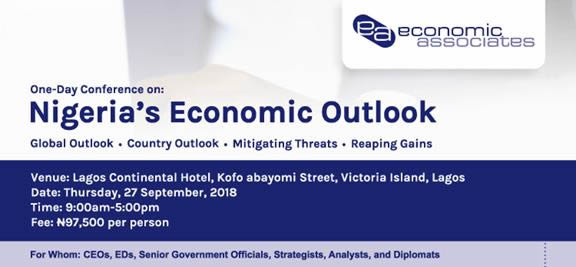
Conversations at the EA conferences revolve around:
1. Global Outlook: The twin-gluts on the global scene: Global commodity glut has replaced the old regime of revenue and foreign exchange windfalls with a new regime of shortfalls; just as Global liquidity glut resulting from cash injections by leading central banks creates opportunities to unlock the liquidity required to mitigate the shortfalls.
2. Country Outlook: as shaped by (a.) Cyclical Swings in: Liquidity- money, bonds, equity, foreign reserves; Growth-GDP growth, sectoral growth; and, Stability- inflation, interest rate, and exchange rates. (b.) Structural Shifts in production and spending, government revenue and expenditures, and activities across the states. (c.) Hurdles limiting the deployment of fiscal, monetary, and investment policies.
3. Mitigating Threats: Identifying and mitigating threats to National, States’, and Companies’ prospects.
4. Reaping Gains: Contemplating actions needed to seize opportunities at Federal, State and Corporate levels.
Related News
1. Nigeria’s Economic Outlook For September 27, 2018 - Conference Registration
2. Nigeria and the Latest MOUs with Nations: UK, Germany and China
3. The Players Change But The Game Remains - LBS Executive Breakfast Session - Sept 2018
4. Market Review and Round-Up of Corporate News Announced During The Week Ending 070918
5. What To Expect From The Markets This Week - 100918
6. NSEASI Extends Losing Streak as Sell Pressure Persists; Records -2.33% Loss WoW
7. The End Of The Oil Price Rally – OIR 080918
8. Yields Trend Higher following Hike in CBN OMO Stop Rate
9. Central Bank makes a U-turn, raises rate to 12.50% for the 182days OMO Bills
10. System Liquidity support bullish interests in the Fixed Income Markets
11. Inflation Rate to Remain Unchanged at 11.14% in August 2018 – FSDH
12. August Headline Inflation Expected to Inch Up to 11.15% - FDC
13. Nigeria and the Latest MOUs with Nations: UK, Germany and China
14. Proshare WebTV Discourse on CBN Policies and Nigeria’s Economy
15. Merchandise Trade Declines in Q2 2018: -8.89% Contraction from Q1 2018 Trade Figure
16. 7th FOCAC Summit: Nigeria, China hold Bi-Lateral Meeting
17. Low GDP Growth Rate in Nigeria: A New Norm?
18. Manufacturing PMI Stands at 57.1% In August 2018 from 56.8% in July 2018
19. President Buhari to attend 7th FOCAC Summit in China
20. FG committed to fast-tracking ERGP Implementation
21. Udoma - There’s Urgent Need To Moderate Rapid Population Growth In Nigeria
22. Perspective on Youth Participation in Nigeria’s Economic Development
23. 2018 Second Quarter GDP and The Missing Growth Syndrome
24. Nigeria’s Q2, 2018 GDP Report: 5 Takeaways
25. Nigeria’s GDP Grew by 1.50% YoY in Real Terms in Q2 2018
 Lagos, NG • GMT +1
Lagos, NG • GMT +1










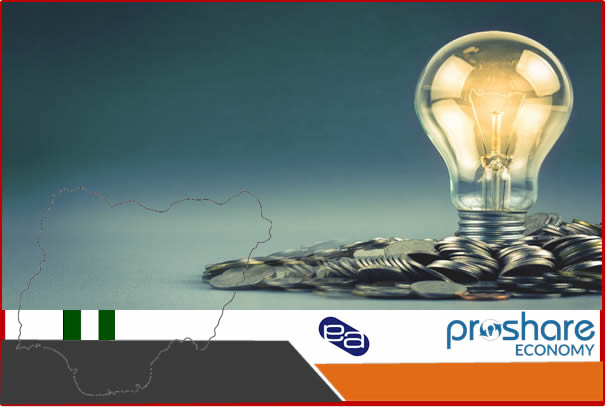
 7890 views
7890 views







 Sponsored Ad
Sponsored Ad
 Advertise with Us
Advertise with Us









